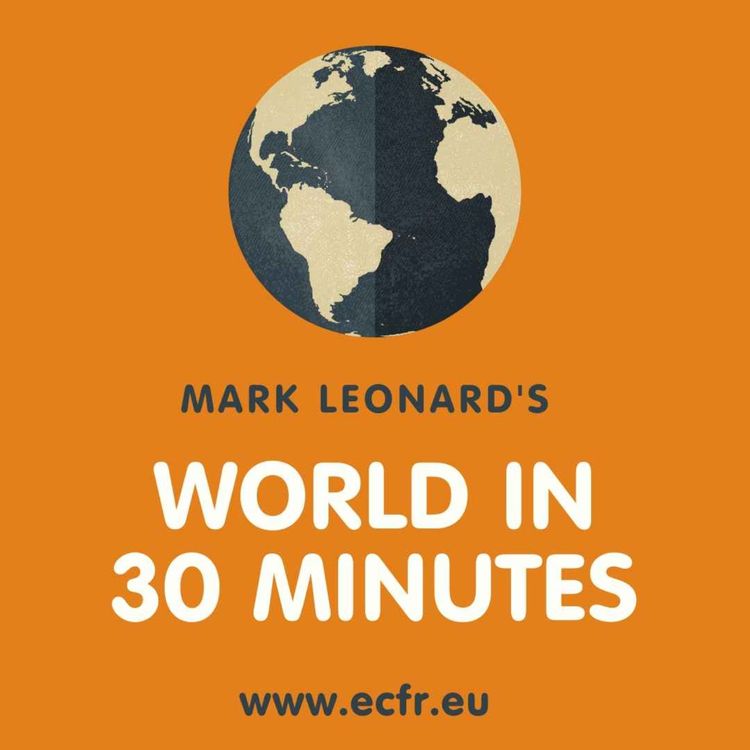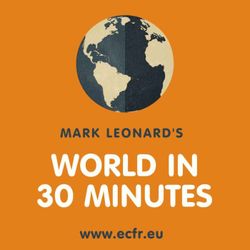Share

Mark Leonard's World in 30 Minutes
Tariffs, tensions, and trade: Trump’s gamble on China
Two weeks after Donald Trump’s sweeping tariff announcement shook global markets, he has now offered most countries a 90-day reprieve—while simultaneously escalating trade tensions with China by imposing harsher penalties. So far, China has responded by matching each tariff hike with its own response.
This week, Mark Leonard welcomes Agathe Demarais, ECFR senior policy fellow and head of its geoeconomics initiative, and Janka Oertel, director of ECFR’s Asia programme, to delve into the complexities of the China-US trade war. Together, they explore the current tariff landscape, the strategies employed by both nations, and the implications for Europe and other external actors. They also discuss China’s aggressive response, potential trade chokepoints and the potential for regional diplomacy.
Who will blink first, Xi Jinping or Trump? Is this a full decoupling of the American and Chinese economies? And what risks and opportunities does the US-China trade war carry for Europe?
This podcast episode was recorded on April 17th 2025.
Bookshelf:
The Most Dangerous Place: A History of the United States in South Asia by Srinath Raghavan
The Year of the Hare by Arto Paasilinna
GeoTechnoGraphy: Mapping Power and Identity in the Digital Age by Samir Saran and Anirban Sarma
More episodes
View all episodes

Security ties and political trade-offs: Inside the EU-UK deal
35:23|This week, Mark Leonard is joined by Camille Grand, former assistant secretary general at NATO and ECFR distinguished policy fellow, and Ivan Rogers, formerly Britain’s permanent representative to the EU, adviser for Europe and global issues to David Cameron, and principle private secretary to Tony Blair. It has been four days after the EU-UK summit and the dust is settling—but questions remain. Together, Mark, Camille and Ivan dive into the security and defence pact, the political asymmetries behind the deal, and what it means for Britain’s domestic landscape. How does the new EU-UK security and defence pact compare to other deals with global partners? Has the UK’s position as demandeur reshaped its leverage, and is this really a win for Europe? And what role will the summit deal play in the Labour government’s European strategy?Bookshelf:Allies at War: The Politics of Defeating Hitler by Tim BouverieRépublique impériale by Raymond Aron This podcast was recorded on May 22nd.
Liberal tides, populist currents: Elections in Poland and Romania
15:43|This week, Mark Leonard is joined by Piotr Buras, head of ECFR’s Warsaw office, for an emergency room episode dissecting Sunday’s pivotal elections in Poland and Romania. Their discussion, which was recorded after high-stakes voting had taken place across Portugal, Poland and Romania, zooms in on some surprising outcomes. Romania’s liberal candidate, Dan Barna, defied polls to defeat far-right contender George Simion, while Poland’s presidential race heads to a tight runoff between liberal Rafal Trzaskowski and right-wing Karol Nawrocki. With Poland’s right-wing bloc commanding 54% in the first round, the stakes are high for Europe’s liberal project. Can Poland replicate Romania’s liberal surge? Or will populism reshape the region’s trajectory? This podcast was recorded on May 19.
Reset or compromise? Taking stock of the EU-UK summit
15:16|This week, Mark Leonard is joined by Mij Rahman, managing director for Europe at Eurasia Group and ECFR council member, for an emergency room episode dissecting the long-awaited EU-UK summit. While the summit’s agreement sets precedents on policies including an agri-food deal, and a security and defence partnership, it falls short of achieving ambitious goals like a customs union. Mark and Mij’s discussion, recorded as European Commission president Ursula von der Leyen, European Council president Antonio Costa and British prime minister Keir Starmer announce the summit’s outcomes, delves into how the EU-UK reset has been marked by such progress—alongside continued unresolved tensions. Amid domestic political pressures, and within a fragmented global order, can this summit lay the foundation for deeper cooperation? Or is it simply one cautious step in a deeply fraught political landscape? This podcast was recorded on May 19.
Trump’s new Europe: From ally to adversary
30:44|Mark Leonard welcomes Célia Belin, head of ECFR’s Paris office and senior policy fellow, to discuss how President Donald Trump’s return to the White House could reshape Europe’s political landscape. Their conversation builds on Célia’s recent policy brief, “MAGA goes global: Trump’s plan for Europe”: she argues that, while Trump’s foreign policy may appear impulsive, it follows a clear ideological playbook which casts Europe not as a partner, but as a target for intimidation, transformation or outright subjugation.Together, Mark and Célia explore what Trump’s worldview means for key European actors and consider how his second-term agenda could erode transatlantic trust. Can Europe push back effectively? Have European leaders grasped the scale of the challenge, or are they still hoping for appeasement? And what would a “MAGA-shaped Europe” look like by the end of Trump’s term?Bookshelf: MAGA goes global: Trump’s plan for Europe by Célia BelinOne Hundred Years of Solitude by Gabriel Garcia Marquez
Truce or trap: Decoding the US-China trade pause
13:04|Far from a grand bargain, the US-China trade deal rolls back President Donald Trump’s post-Liberation Day tariff spiral—which peaked at 145%—to pre-April levels. This will avert empty US shelves, but leaves underlying tensions unresolved. In this emergency room episode, Mark Leonard welcomes Janka Oertel, head of ECFR’s Asia programme, to dissect the recent de-escalation, which the parties agreed this week in Geneva. The conversation explores who holds the upper hand, the prospects for a 90-day negotiation period, and the broader clash between deal-making instincts and systemic rivalry. For Europe, caught between US pressure and a less desperate China, the stakes are high as it navigates an upcoming EU-China summit. Is this a fleeting truce or a sign of deeper shifts in global trade?This episode was recorded on May 14.
Border geopolitics: India and Pakistan revisited
16:56|Over the weekend, India and Pakistan came closer to all-out war than perhaps at any point in the past 20 to 25 years as missiles flew back and forth across the border. At the point of this podcast recording, a fragile ceasefire appears to be holding—but tensions remain high.In this week’s emergency podcast episode, Mark Leonard welcomes Andrew Small, senior transatlantic fellow with the German Marshall Fund’s Indo-Pacific programme, to discuss how the recent escalation of tensions between India and Pakistan highlights the potential for nuclear conflict. They also explore America’s role in mediating the situation, implications for Europe in light of the evolving geopolitical landscape, and the growing influence of China in the region.What has led to the most recent conflict events between India and Pakistan? How did each side negotiate the ceasefire? And, as Europeans, what lessons have we learned from the countries’ retaliatory acts? This episode was recorded on May 12th 2025.
A new chapter in German politics
32:17|As of May 6th, Germany has a new government, led by the CDU’s Friedrich Merz in coalition with the CSU and SPD. Despite a last-minute hitch, Merz is now safely installed in the Bundeskanzleramt in Berlin, from where he immediately jetted off to Paris and Warsaw for high-level political meetings. In this episode, Mark Leonard welcomes Jeremy Cliffe, ECFR editorial director and senior policy fellow, and Jana Puglierin, ECFR’s Berlin office head and senior policy fellow, to discuss the new German government and the legacy of the previous “traffic light” coalition. How will Merz’s government differ to its predecessor? What will its main challenges be? And what does Merz’s embarrassing first round defeat in the Bundestag suggest for the rest of his term?This podcast was recorded on May 8th, 2025.Bookshelf:Podcast | What’s next for Berlin?From fence-sitter to pace-setter: How Merz’s Germany can lead Europe by Jeremy Cliffe and Jana Puglierin
100 days of Trump
28:32|Trump’s first 100 days in office have brought chaos to US foreign and domestic policy. From imperial gestures to institutional erosion, Mark Leonard welcomes Jeremy Shapiro to unpack what this means for American democracy—and for Europe.From territorial provocations and budget slashes to institutional chaos and a reordering of US foreign policy, Donald Trump’s early months in office have shaken American governance and global diplomacy alike.This week, Mark Leonard welcomes Jeremy Shapiro, ECFR’s editorial director and head of the Washington office, to unpack what we’ve learned so far. What foreign policy vision is emerging from this administration? Why have Americans remained passive in the face of democratic backsliding? And what does this all mean for Europe’s role in the world?Bookshelf: Railroaded: The Transcontinentals and the Making of Modern America by Richard WhiteThis podcast was recorded on 28th of April 2025.
What’s next for Berlin?
14:31|Friedrich Merz is set to become Germany’s next chancellor after Social Democratic Party members approved a coalition agreement with the Christian Democratic Union and its Bavarian sister party the Christian Social Union—bringing Olaf Scholz’s tenure to an end. In this emergency episode of World in 30 Minutes, Mark Leonard is joined by Jana Puglierin, head of ECFR’s Berlin office, to break down what happens next. How have the ministries been divided up? What does it reveal about the direction of the new government? And how will it shape Germany’s role in Europe and the world? This podcast was recorded on 30th of April 2025.